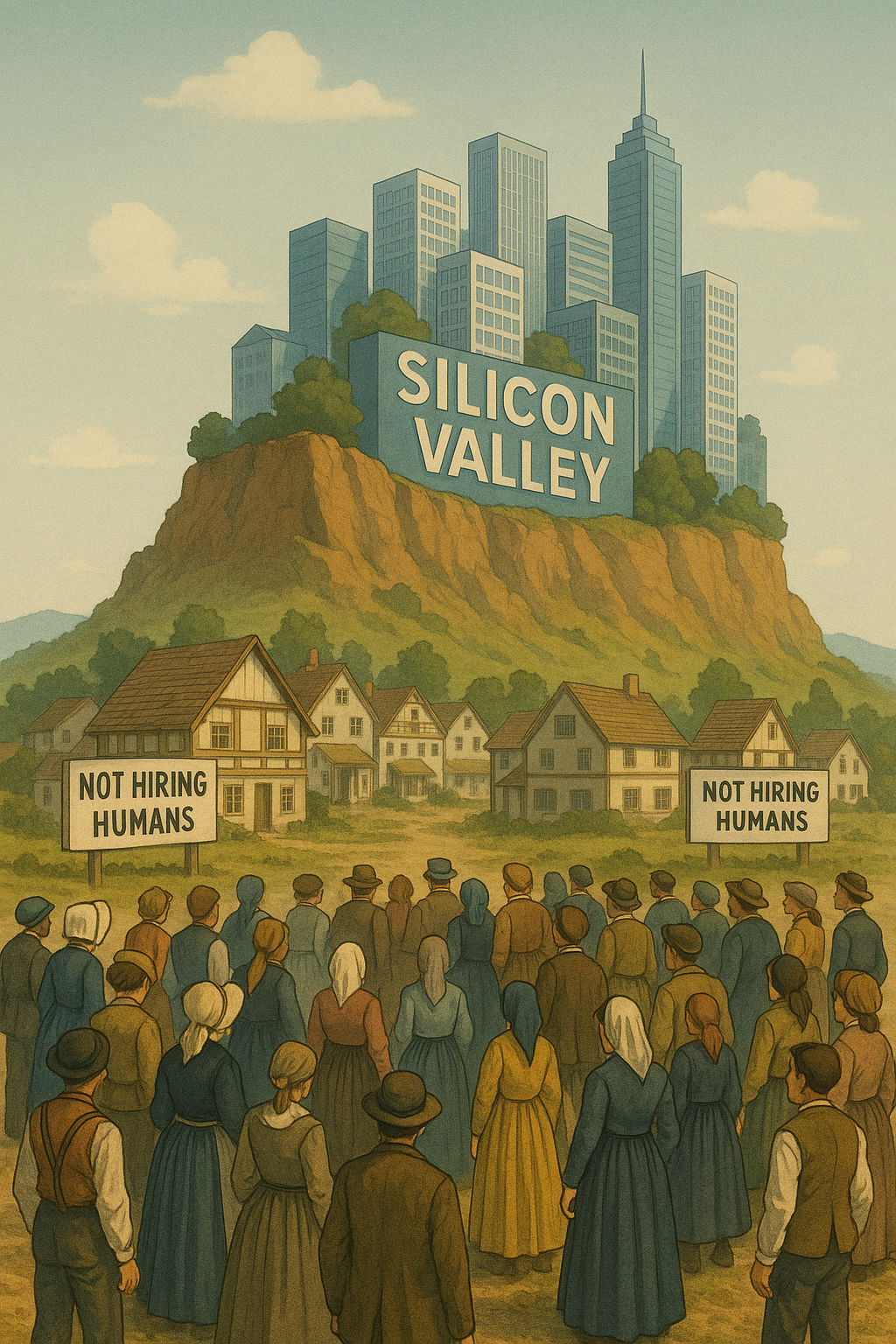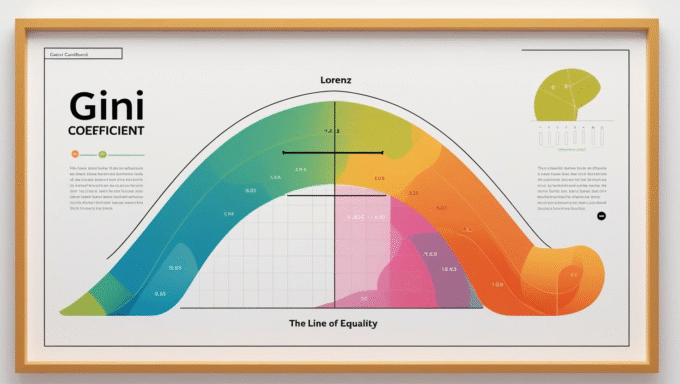The artificial intelligence revolution isn’t coming—it’s here. And while tech billionaires celebrate AI’s potential to transform our world, millions of working Americans face a harsh reality: the same technology promising unprecedented prosperity threatens to leave them further behind than ever before.
For young adults entering the workforce, families struggling to make ends meet, and communities already fighting for economic opportunity, AI represents both immense promise and existential threat. The question isn’t whether AI will reshape our economy—it’s whether we’ll act fast enough to ensure that transformation benefits everyone, not just those who already hold the keys to wealth and power.
The Employment Earthquake
AI’s impact on jobs extends far beyond the factory floor automation of previous decades. Today’s AI systems can write legal briefs, diagnose medical conditions, create marketing campaigns, and analyze financial data—skills that once guaranteed middle-class stability. A 2023 Goldman Sachs study estimates that AI could affect 300 million full-time jobs globally, with administrative and legal professions facing particularly high exposure.
But the threat isn’t uniform. While software engineers and data scientists see their skills become more valuable, customer service representatives, bookkeepers, and entry-level analysts face displacement. The result? A bifurcated economy where high-skill workers thrive while others scramble for increasingly scarce opportunities.
Consider Maria, a 28-year-old paralegal in Phoenix, whose firm recently adopted AI tools that can review contracts in minutes rather than hours. Her workload has been cut by 60%, and she’s competing with dozens of other paralegals for fewer positions. Meanwhile, the partners who own the AI technology are billing clients the same rates while dramatically reducing labor costs—capturing nearly all the productivity gains for themselves.
This pattern repeats across industries. The owners of AI technology and capital accumulate wealth at an unprecedented pace, while workers see their bargaining power erode. It’s not just about job displacement—it’s about who captures the value that AI creates.
The Concentration of AI Wealth
The AI boom has already created staggering wealth concentration. Just five technology companies—Microsoft, Google, Amazon, Meta, and Apple—control the vast majority of AI infrastructure and research. Their combined market value has increased by over $2 trillion since the current AI surge began in 2022, enriching shareholders while workers across the economy face uncertainty.
This concentration matters because AI development requires enormous capital investments that only the largest corporations can afford. Training cutting-edge AI models costs hundreds of millions of dollars, creating insurmountable barriers for smaller companies and ensuring that AI’s benefits flow primarily to those who already possess vast resources.
The result is a feedback loop where AI-generated profits enable even larger AI investments, further concentrating economic power. As these companies automate more jobs and capture more market share, traditional employers struggle to compete, leading to wage stagnation and reduced worker leverage across the economy.
The Democracy Deficit
Perhaps most troubling is how AI-driven wealth concentration threatens democratic governance itself. When a handful of tech executives control technologies that reshape entire industries, their political influence grows exponentially. Campaign contributions, lobbying expenditures, and regulatory capture become tools for protecting and expanding their AI advantages.
Young voters have witnessed how money in politics distorts policy priorities. From healthcare to climate change, wealthy interests often override popular will. Now, as AI creates even more concentrated wealth, this dynamic threatens to accelerate. The tech billionaires profiting from AI automation have little incentive to support policies that would share those gains more broadly.
Meanwhile, the communities most harmed by AI displacement—working-class families, communities of color, and rural areas—often lack the political resources to demand protection. The democratic process that should ensure AI serves everyone becomes captured by those who benefit most from the status quo.
Social Mobility Under Siege
The American dream has always centered on the possibility of upward mobility through hard work and education. But AI threatens to make that dream increasingly hollow for entire generations.
Traditional pathways to middle-class prosperity—administrative roles, mid-level management, skilled trades requiring routine cognitive tasks—face elimination or devaluation. At the same time, the new high-paying AI-related jobs require specialized technical education that remains expensive and inaccessible to many.
For Black and Latino communities already facing systemic barriers to wealth building, AI’s impact could be particularly severe. These communities are overrepresented in jobs with high automation risk while underrepresented in AI development and ownership. Without intervention, AI could entrench and amplify existing racial wealth gaps.
Young adults face a particularly cruel paradox: entering adulthood just as AI eliminates many entry-level positions that previous generations used as stepping stones to career advancement. College graduates find themselves competing not just with each other, but with algorithms that work 24/7 for the cost of electricity.
The Policy Imperative
Addressing AI’s impact on wealth inequality requires bold, immediate action across multiple fronts:
Universal Basic Assets: Rather than just redistributing income, we need policies that give ordinary Americans ownership stakes in AI-driven productivity. This could include sovereign wealth funds that invest in AI companies and distribute dividends to citizens, or requirements that AI companies issue equity to workers whose jobs they automate.
Progressive Automation Taxes: Companies that use AI to eliminate jobs should face taxes that fund retraining programs and support displaced workers. These taxes would slow harmful automation while generating revenue for those left behind.
AI Antitrust Enforcement: Breaking up tech monopolies and preventing further consolidation in AI markets can ensure competition and prevent excessive wealth concentration. This includes regulating AI infrastructure as a public utility.
Campaign Finance Reform: Limiting the political influence of AI billionaires through campaign finance restrictions and lobbying regulations is essential for maintaining democratic governance in an age of concentrated technological power.
Public AI Development: Government investment in AI research and development can create alternatives to corporate-controlled systems, ensuring that AI serves public rather than purely private interests.
Guaranteed Training and Transition Support: Robust retraining programs, portable benefits, and income support during career transitions can help workers adapt to AI-driven changes without falling into poverty.
The Window for Action
History shows that technological revolutions create brief windows when their direction remains malleable. The Industrial Revolution could have developed very differently with stronger worker protections and more equitable ownership structures. We have a similar opportunity with AI—but only if we act quickly.
The longer we wait, the more entrenched AI-driven inequality becomes. Tech companies are already using their AI advantages to reshape markets, eliminate competitors, and capture regulatory processes. Their head start in AI development translates into political and economic power that will be increasingly difficult to challenge.
Young progressives understand this urgency. They’ve watched decades of increasing inequality, declining social mobility, and corrupted democracy. They know that without intervention, AI will accelerate all these trends beyond the point of democratic correction.
A Future Worth Fighting For
The goal isn’t to stop AI development—that would be both impossible and counterproductive. AI has genuine potential to solve climate change, cure diseases, and eliminate poverty. The question is whether we’ll structure our economy and politics to share those benefits broadly or allow them to concentrate among the few.
This fight isn’t just about economics—it’s about the kind of society we want to build. Do we accept a future where AI creates unprecedented abundance for tech billionaires while leaving everyone else to compete for scraps? Or do we demand that the tools reshaping our world serve the common good?
The choice is ours, but only if we make it soon. Every day of inaction allows AI-driven inequality to deepen and AI-concentrated power to entrench itself further. The time for incremental reforms and cautious half-measures is over.
We need representatives who understand that AI isn’t just a tech issue—it’s the defining challenge of our economic and political future. We need policies that put people before profits and democracy before corporate convenience. Most importantly, we need to act before the window of opportunity closes forever.
The AI revolution will determine whether the next generation inherits a more equitable world or one where technology serves only the powerful. That outcome isn’t predetermined—it’s a choice we make through our politics, our policies, and our willingness to demand better.
The future is still ours to write, but only if we pick up the pen.













Leave a comment